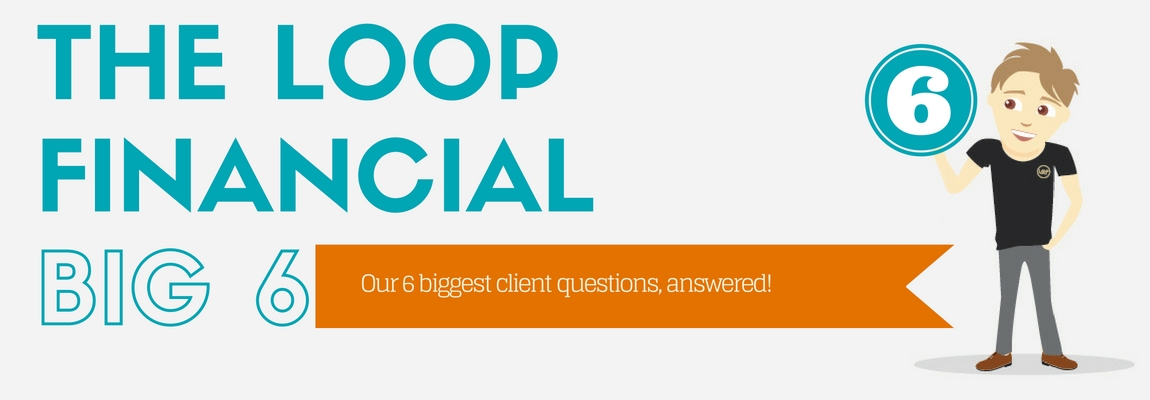What is a credit record and how can i build a great credit record?
One of the Loop Financial Big 6 client questions, this time on building a great credit record.
When it comes to getting a mortgage, whether it’s for a property investment or your own home, one of the things that will make or break the deal at the bank is your credit score or credit record.
You can have a sizeable deposit saved and put on your most trustworthy smile, but if your credit record is terrible they aren’t going to lend to you – at least not at rates you can afford.
But despite this being such an important aspect of securing the financing you need, many people overlook it until the last minute and then get a nasty surprise.
Lauren Mamaj, Finance Stategist and Chief Number Cruncher at Loop, runs through some of the ways you can improve your credit record and be prepared for that nerve-wracking interrogation at the bank.
Understand your credit record or credit score
“Understanding your credit record or credit score is critical,” says Lauren. “There are a number of different credit agencies, but Veda Score is the number one credit agency in Australia.”
 Your credit provider will check your credit record whenever you apply for credit – that could be for anything from a new TV or car, to a credit card, to a loan for home renovations or a new mortgage.
Your credit provider will check your credit record whenever you apply for credit – that could be for anything from a new TV or car, to a credit card, to a loan for home renovations or a new mortgage.
Scores range from zero to 1,200 and the higher your score, the better your chances of having credit approved.
So how can you tell what your finances look like to a bank or a mortgage broker? Simple: you can request your credit score for free once every 12 months. You’ll receive a written document that shows any enquiries you’ve made, your personal information, your address, your employment information, and any defaults against your name. All of this feeds in to that all-important number.
So what kind of score are the banks looking for when you apply for a mortgage or other financing?
“If you can get to the 800 plus mark it’s good,” explains Lauren. “A score of 600 is not great but it’s not bad either – you’re mid-range.”
To make it easier to gauge, your Veda Score is shown on a traffic light scale where a score closer to zero will be shown as red, progressing through amber to green as you reach the top end.
Your score can be knocked back by a high number of credit enquiries, loan defaults, and even unpaid bills, but once you can see what’s affecting your score you can take steps to improve it.
Improving your credit score
If you’ve checked your score and it’s well within the red zone, or if you’ve been refused credit for a property loan or some other kind of financing, don’t despair.
There’s no immediate fix, but there are several things you can work on to improve your score within a few months, says Lauren.
Stop applying for credit to improve your credit record
You might not realise it, but the simple act of applying for credit can affect your score, especially if you have, say, 20 enquiries in one month for a credit card.
“We always recommend to clients not to just jump online and submit enquiries for credit without thinking about what they are doing as every enquiry stays on their credit file for five to seven years before it comes off,” says Lauren.
“There are some websites for instance where you submit a credit card application and it sends off applications for three or four credit cards with different banks at the same time and now you’ve got four credit enquiries on your file for the next five to seven years.”
You can expect some tough questions from the bank if they can see all these credit applications against your name, so just be mindful that whenever you apply for finance, that credit enquiry could impact your chances of getting a loan approved for years to come.
One simple way to increase your credit score, therefore, is to just not submit any credit enquiries for a period of time.
Cross-check and remove any inaccuracies from your credit record
You might receive your credit report and discover that something on there truly doesn’t match your financial history.
“For instance the broker could have submitted an application to two lenders, when they should’ve just actually gone to one. So you’ve got two credit enquiries for the same application. You can apply to have that removed, which improves your credit score,” explains Lauren.
Pay your bills on time
Even something as innocent as paying your mobile phone bill a bit late can affect your credit record. Yep, if a utility provider or mobile phone company has an issue with you, they can report it to Veda so anyone else who checks can see your poor payment history, making them less willing to offer you credit in the future.
So if it’s a choice between your electric bill and a new pair of shoes…
Become a good borrower
If you’re new to the world of credit then you may not have a credit score at all.
For brand new borrowers, a mobile phone contract can be a great way to start building up a credit score and proving you can be trusted to make payments on time (just make sure you DO pay your bills on time – a direct debit is handy if you tend to forget).
You may also qualify for a credit card with your existing bank with a small limit of, say, $500.
“Having a small credit card and paying that monthly in full before it’s due helps improve your credit score because you’re proving to the bank your credit worthiness, by paying credit on time,” Lauren explains.
So you can use your credit card for small purchases, even the weekly shop, as long as you keep enough money to pay it back every month. Don’t be tempted to blow the lot on a night out or holiday that you can’t afford, because that’s where your credit score can start spiralling downwards.
Maintaining a good credit record
Once you understand how your credit score appears to potential lenders and you’ve got it to a reasonable level, you want to make sure it stays that way.
One of the things that’s easiest to forget, but most important to do, says Lauren, is keeping your contact details up-to-date.
 “A common issue is that someone’s moved address and hasn’t updated their contact details with their credit provider or Veda, so they’ve been issued with a default on their loan because the lender has not been able to contact the client,” she says.
“A common issue is that someone’s moved address and hasn’t updated their contact details with their credit provider or Veda, so they’ve been issued with a default on their loan because the lender has not been able to contact the client,” she says.
Lauren also recommends checking your credit file once a year, regardless of whether you’re planning to apply for a loan, so that you can be aware of your score and deal with any issues before they become a problem for you.
Her suggestion is to tie it in with doing your tax at the end of the financial year, because you’re already in money mode. This is a good time to review any enquiries you’ve had over the past year and look at ways to improve your score for the year ahead, potentially working with a mortgage broker or financial advisor who understands the ins and outs of credit scores.
You can manually request a copy of your credit file once a year, but Veda offers different levels of service for those who want more than just an annual report. For example, you can subscribe to get instant alerts if anyone checks or updates your credit profile, enabling you to catch any errors straight away and deal with them quickly.
“Credit is something to guard and protect,” says Lauren, so it’s time to get yourself informed and take some steps to show your credit record how much it means to you.
Disclaimer *Your full financial situation would need to be reviewed prior to acceptance of any offer or product.
Credit Representative Number 482730 is authorised under Australian Credit Licence Number 389328.

